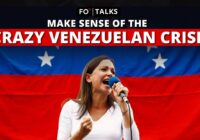On June 28, as 21 million Venezuelans awaited the election results, the opposition reported a sudden halt in the vote count. Hours later, electoral authorities declared President Nicolás Maduro the winner with 51% of the vote, despite record turnout and forecasts heavily favoring opposition leader Edmundo González. With tight control over the election authority, Maduro secured another six-year term, extending his rule since taking power after Hugo Chávez’s death in 2013.
Unlike previous Venezuelan elections over the past 25 years, where incumbents always emerged victorious, this year’s election gave the opposition a genuine chance at victory. The day after the vote, opposition leader María Corina Machado declared the election rigged. Citing tally sheets from polling stations, she reported that González received about 70% of the vote, while Maduro only secured 30%.
The opposition claims are backed by an independent analysis of 83% of voting records, which confirmed González won 67.1% of the votes to Maduro’s 30.4%. These records are publicly available, unlike the official results, which remain inaccessible to date. This analysis also closely aligns with independently conducted pre-election polls predicting a large-margin victory for González.
Several governments in the region, including Argentina, Chile, Uruguay and Peru, questioned Maduro’s win. In response, Maduro cut diplomatic ties with them the next day. Even allies like Brazil, Colombia and Mexico urged him to disclose the voting records to legitimize his win. The European Union rejected the results due to electoral irregularities, and the US went further to officially recognize González as the winner.
If Maduro had acknowledged the true election results, it would have made Venezuela the latest Latin American country to transition to democracy. Sadly, the government seems to be sliding further into autocracy, fueling ongoing protests. Now, it’s clear that the Venezuelan dictatorship is prepared to remain in power at any cost.
The rise of the opposition
Since 2018, when Maduro won a second presidential term through illegal election manipulation, Venezuela’s opposition has grown stronger.
A key moment demonstrating this growing strength was former opposition leader Juan Guaidó’s formation of an interim government in 2019 using constitutional provisions, which gained support from the US and several Latin American countries. However, in 2021, the National Assembly, dominated by Maduro’s regime, dissolved Guaidó’s government. Three of the four main opposition groups then sought to form a united coalition for the 2024 elections.
In 2023, with Guaidó and two other former opposition leaders in exile, María Corina Machado took the lead in building a civic movement against Maduro. By mid-2023, Machado had achieved unprecedented popularity, not seen since the Bolivarian Revolution under Chávez. Her charisma and conciliatory approach united Venezuelans around the once unthinkable goal of defeating Maduro.
Eduardo González secured the “Democratic Unity” nomination after the Electoral Court, under Maduro’s control, declared María Corina Machado ineligible in 2023. Efforts to replace her with another ally failed twice, making González the official nominee. Despite these hurdles, the opposition coalition has successfully unified Venezuelans in their push for government change and democratization.
On the campaign trail, González and Corina traveled across Venezuela on what they call their “Caravan for Liberty.” They focus on small and medium-sized cities, drawing large crowds to rallies to voice disapproval of the regime. In contrast, Maduro concentrated on rallies in Chávez-supportive areas, which attracted fewer attendees.
While support for the opposition grew, backing for Maduro and his regime faded.
Waning support for the regime
Maduro’s credibility as a democratic leader has been marred by his chauvinistic rhetoric, poor human rights record and autocratic tendencies. In the final days of the campaign, Maduro intensified his aggressive rhetoric. He attacked foreign media and questioned the legitimacy of electoral processes in democratic countries. He also revoked invitations to official election monitoring delegations, including one led by former Argentine President Alberto Fernández.
Still, hopes remained that basic rules for free and fair elections would be respected this year, given the Barbados Agreement signed between the Venezuelan government and opposition in October 2023. The Agreement aimed to hold the presidential elections in the second half of 2024 with international monitoring and opposition participation in primaries. However, it has been systematically violated. The US partially lifted sanctions to encourage compliance, but reinstated them six months later. After the election, the US seized Maduro’s airplane for sanction violations, signaling its disapproval of the autocratic leader.
Sanctions have exacerbated Venezuela’s economic collapse, straining the subsidies and social programs that many poor Venezuelans rely on. Since Chávez’s death in 2013, Venezuela’s economic and humanitarian crises have worsened, straining the country’s ability to provide basic services. Under this state of permanent crisis, the regime has increasingly resorted to corruption to maintain loyalty among allies and the military. In a desperate attempt to keep the military unified in support of the regime, Maduro tried to illegally annex Esequibo, a disputed territory with Guyana, in 2023.
As a result, Maduro’s popularity has declined. According to Delphos, 25.1% of Venezuelans believe his government is bad and 47.2% believe it is very bad.
Election day and its aftermath have been tense and filled with protests. About 42% of Venezuelans have stated they will protest if Maduro remains in power, and nearly 81% see the 2024 election as a crucial turning point for regime change.
Maduro lacks international support for his current efforts to stay in power, but there is little consensus on how to address the situation. Most Latin American countries advocate for increased international pressure on Maduro and push for a peaceful transition to democracy. However, Brazil and Colombia, which are currently the most influential in Venezuelan affairs, argue that Venezuela’s international isolation limits diplomatic options for facilitating this transition.
A long walk to democracy
This year’s presidential election in Venezuela represents a watershed moment in the 25-year autocracy of Chávez and Maduro. Still, a peaceful transition will be challenging for several reasons.
First, the army plays a crucial role in Venezuela’s crisis. Though not formally a military regime (often classified as a hybrid regime), Chávez’s Bolivarian Revolution was built on militaristic foundations. Chávez first gained prominence in 1992 through a failed coup and, since his election in 1999, has structured the revolution around two pillars: chauvinistic social mobilization and military support. With the possibility of contested results, the likelihood of violence is high, making the army critical for a regime struggling to maintain control.
Second, transitions involving massive public participation, or “transitions from below,” tend to be sudden and violent. However, Venezuela’s social mobilization has been comparatively weak. For a gradual, peaceful transition to occur, the government would need to negotiate with the opposition and open up the regime. There is little likelihood that Maduro will agree to any kind of political transition or modification in the present status quo as long as the army supports his government. Venezuela thus has few options to democratize.
Venezuela’s path to democracy will be winding if Maduro, like Chávez, continues using illiberal tactics to stifle the opposition and create an uncompetitive electoral environment. The regime has attempted to limit the opposition’s communication ability, though key candidates still managed to appear on public networks. In the past few months, the crackdown on dissent has intensified: Six of María Corina Machado’s close aides, including her campaign manager, sought refuge at the Argentine Embassy in Caracas to avoid arrest. Additionally, a week before the election, Machado’s chief of security was detained by police for 24 hours for undisclosed reasons.
For the moment, despite repression, the opposition’s best course of action is to keep using democratic strategies. Historically, Latin American dictatorships have an expiration date, with the few exceptions being Cuba and Nicaragua. Mexico’s slow path to democratization in the 1990s demonstrated how a dictatorship weakens when confronted with elections with a sizable popular opposition. The country ended a 60-year domination of a revolutionary party in 2001 by electing a president from the opposition.
The regime has lost much of its popular support, while the opposition has gained momentum. Despite the possibility of Maduro becoming more radical and repressive, these new dynamics make a democratic transition more likely than in the past.
[Ting Cui edited this piece.]
The views expressed in this article are the author’s own and do not necessarily reflect Fair Observer’s editorial policy.
Support Fair Observer
We rely on your support for our independence, diversity and quality.
For more than 10 years, Fair Observer has been free, fair and independent. No billionaire owns us, no advertisers control us. We are a reader-supported nonprofit. Unlike many other publications, we keep our content free for readers regardless of where they live or whether they can afford to pay. We have no paywalls and no ads.
In the post-truth era of fake news, echo chambers and filter bubbles, we publish a plurality of perspectives from around the world. Anyone can publish with us, but everyone goes through a rigorous editorial process. So, you get fact-checked, well-reasoned content instead of noise.
We publish 2,500+ voices from 90+ countries. We also conduct education and training programs
on subjects ranging from digital media and journalism to writing and critical thinking. This
doesn’t come cheap. Servers, editors, trainers and web developers cost
money.
Please consider supporting us on a regular basis as a recurring donor or a
sustaining member.
Will you support FO’s journalism?
We rely on your support for our independence, diversity and quality.











Comment